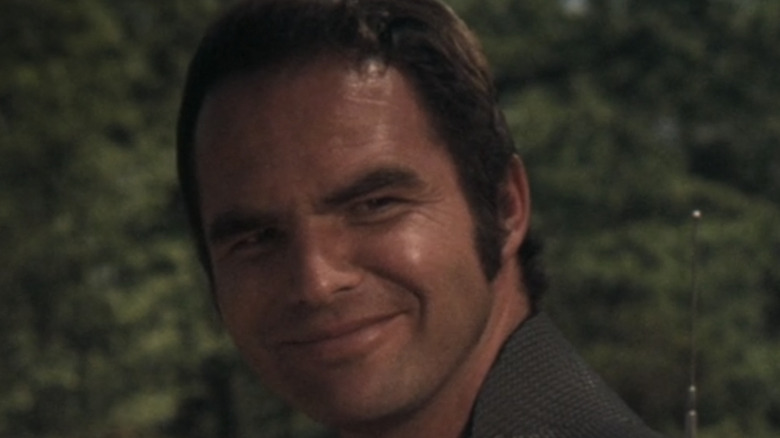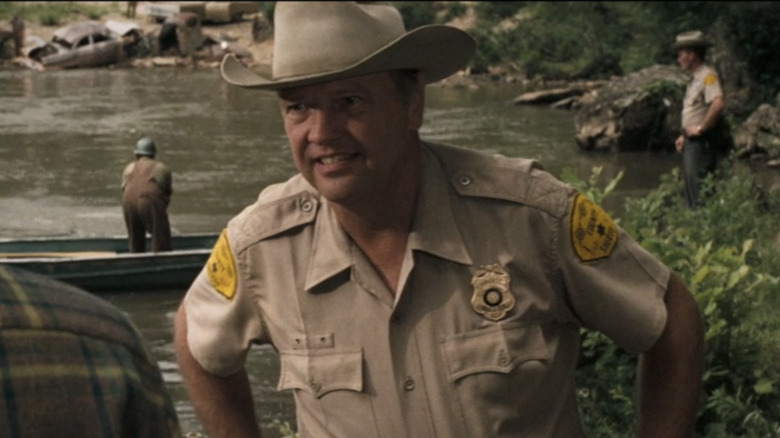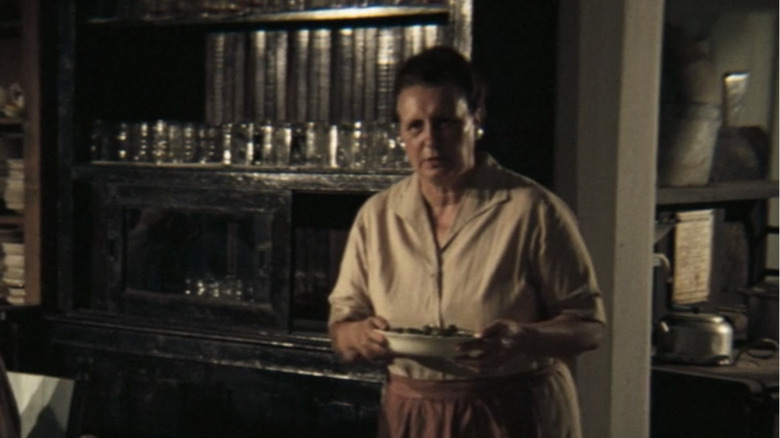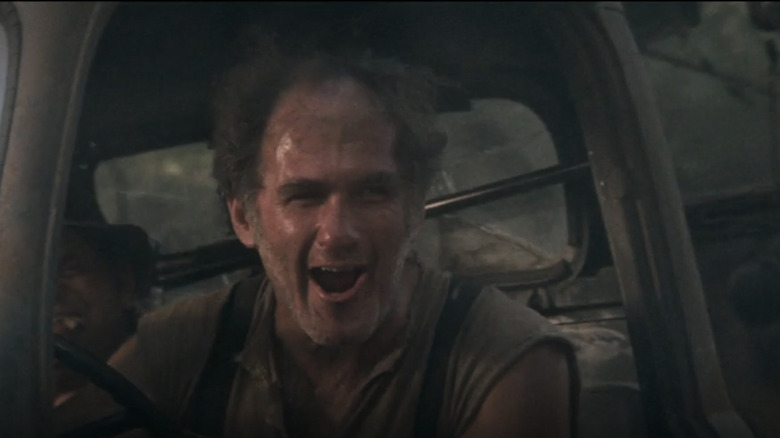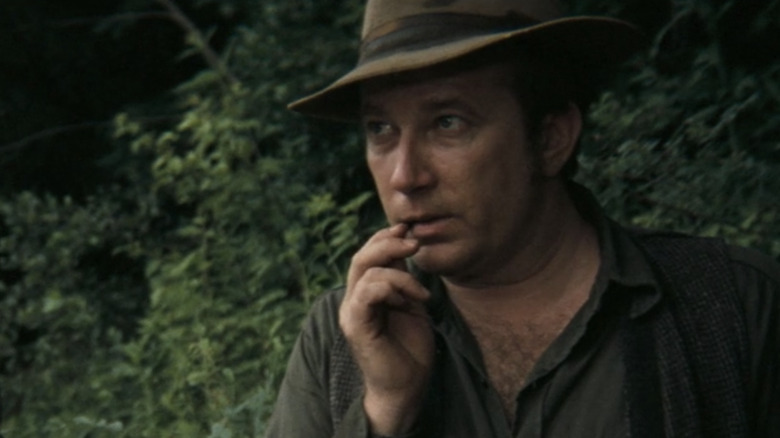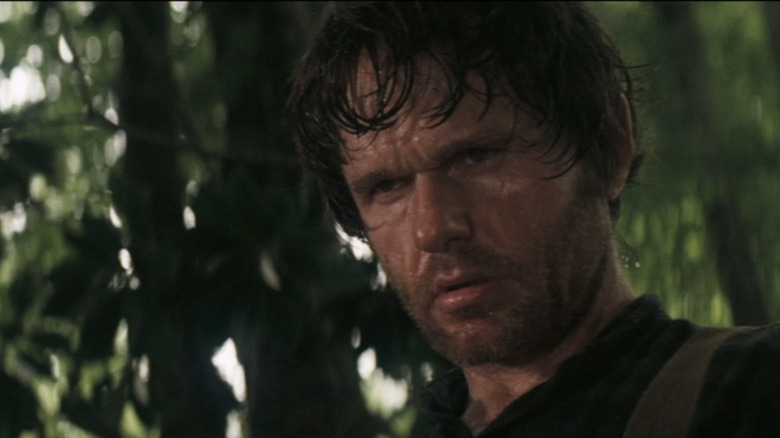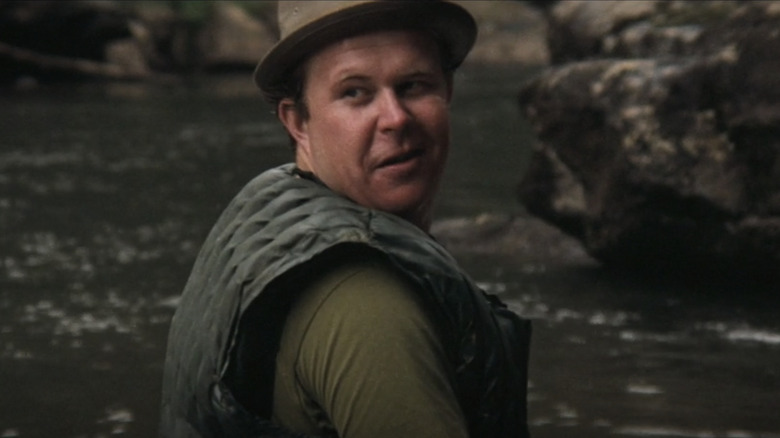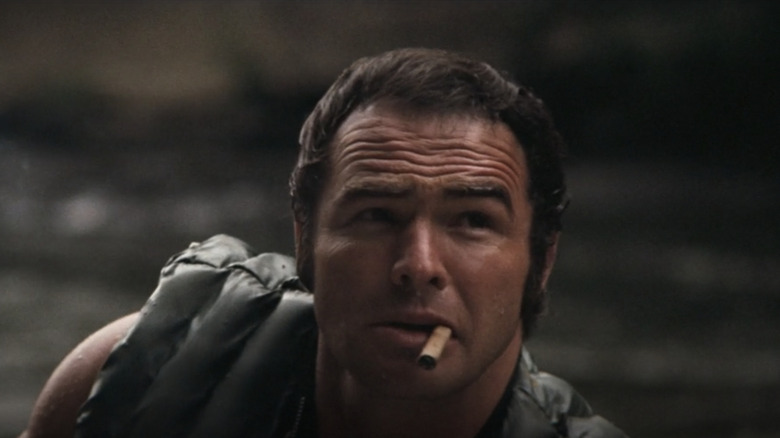Deliverance Actors You Might Not Know Passed Away
We may receive a commission on purchases made from links.
Critics in 1972 didn't quite know what to make of John Boorman's backwoods survival thriller "Deliverance." Many were impressed by the performances of Burt Reynolds, Jon Voight, Ned Beatty, and Ronny Cox as a group of Atlanta businessmen fighting for their lives after a weekend canoeing trip in the Georgia mountains goes terribly wrong. Many — even those who praised the performances — were disturbed by its graphic violence and unflinching brutality. Based on the novel by poet James Dickey, "Deliverance" was and remains a harrowing journey into the American heart of darkness.
However ambivalent critics might have been at first, audiences loved it. "Deliverance" was the fourth highest-grossing film of 1972 and went on to be nominated for three Academy Awards. Today, it is regarded as a modern classic of masculinity in crisis, and many of its most indelible moments have made their way into the pop culture lexicon, for better and for worse: The banjo and guitar duet heard in the film, "Duelin' Banjos," is often used to parody the film specifically, or poor rural Southerners in general.
Fifty years later, the film has lost little of its power to shock and disturb, but it has lost a few of its cast members. Let's take a look at the "Deliverance" actors you may not know passed away.
James Dickey
Larger-than-life poet and novelist James Dickey wrote both the 1970 novel of "Deliverance" and the film's screenplay. He has a small but pivotal role toward the end of the film as Sheriff Bullard, the local officer whose probing questions begin to poke holes in the surviving men's story about just what happened on the river. In an oral history of the film published in Garden & Gun in 2015, director Boorman and stars Cox, Beatty, Voight, and Reynolds relate how Dickey was a constant, distracting presence on set when production first began, often drunk and holding court. It took a meeting with all five men to convince Dickey to leave until it was time to film his scenes as the sheriff.
"Jim was a very imposing figure," Boorman said of the confrontation. "He drew himself up in front of the four men and with his eyes blazing he said, 'It appears that my presence would be most efficacious by its absence.' And he left. Burt said to me, 'Does that mean he's going or he's staying?'"
Born in Georgia, Dickey served in World War II and worked as a teacher and copywriter before turning to writing full time in the 1960s. Many of his books of poetry, including "Into the Stone, and Other Poems," and "Buckdancer's Choice," which won the National Book Award in 1965, are powered by the same themes that drive "Deliverance": Masculinity and violence, the changing face of the South, the precarity of civilization and the power of nature, delivered in a formally innovative style he referred to as "country surrealism." He lived up to the two-fisted style of his writing, with an outsized personality to match his burly frame. Dickey died in 1997 at age 73.
Louise Coldren
The film derives a lot of its sense of place by casting smaller roles with locals and non-professional actors. One of those locals was hotel owner Louise Dillard Coldren, seen toward the end of the film bringing food to a table of boarders, including Ned Beatty's Bobby. Coldren has just a handful of lines to Ed (Jon Voight), who warily sits down at the table with everyone, then breaks down in relief when offered food. The scene represents the other side of the South, the ones who would save a seat at the table for a stranger and feed him; it's an important counterweight to the decidedly inhospitable locals that the men have met thus far.
Coldren was a member of the Dillard family, who own and operate the still-thriving Dillard House resort. At the time Coldren also ran a hotel in nearby Clayton, where the "Deliverance" cast and crew stayed while filming. According to a warm remembrance published in 2000 for the Tennessee Valley Canoe Club newsletter, Coldren would joke for years afterward that she was the "other woman" in Burt Reynolds' life; a picture of her with Reynolds and his then-wife Loni Anderson hung in the Dillard House gallery for years. In addition to her small on-camera role, she also assisted the production with location scouting. By all accounts, Coldren was a beloved member of her community, prone to jokes and big hugs. She died of cancer in 1992.
Seamon Glass
"Where you goin', city boy?" Spoken by character actor Seamon Glass in the role of "First Griner" after Lewis (Burt Reynolds) has made a wrong turn on the way to the river, that line in many ways distills the conflict of "Deliverance" down to its essence — the veiled menace, the contempt that both the city slickers and the locals feel for one another, and the probability that Lewis' ego is going to get someone killed. It has gone on to become one of the all-time famous movie quotes, even sampled by bands like Primus.
Glass was one of the few out of town actors cast as a Cahulawassee River native. He was born in New York before moving with his family to Southern California at age thirteen. He served in the Pacific theater in World War II and went to school on the GI Bill. Acting was never his main profession; over the years he was a boxer, a stuntman, a merchant marine, and most notably, a teacher and guidance counselor in Los Angeles for over 30 years. In addition to his small role in "Deliverance," Glass starred in the nuclear disaster B-movie "This is Not a Test," and appeared on episodes of "Perry Mason," "Buck Rogers in the 25th Century," "Vega$" and more. In 2010 he published a novel based on his experiences in World War II, "Half Assed Marines." Glass died in 2016 at age 90.
Macon McCalman
"Deliverance" was theatre actor Macon McCalman's first on-screen role. As Deputy Queen, McCalman gets testy with Bobby (Ned Beatty) about some inconsistencies in he and Ed's (Jon Voight) story. The reason, Sheriff Bullard explains, is that Queen's brother-in-law was part of a hunting party and has gone missing — possibly because he was one of the men that Ed, Bobby, and Lewis killed in the mountains. It's a small role, but the scene emphasizes how incestuous (figuratively or otherwise) this world is, and that even though Ed and Bobby are no longer on the river, they are still in danger.
After "Deliverance," McCalman carved out a respectable career in front of the camera for more than two decades, often in roles that took advantage of his Southern upbringing, as in "Smokey and the Bandit," the Jane Fonda western "Comes a Horseman," and "Fried Green Tomatoes." On television he made guest appearances on everything from "Three's Company" to "The Fresh Prince of Bel Air," and had a rare recurring role on "Roots" author Alex Haley's short-lived racial drama "Palmerstown, USA" in 1980. In 2020, McCalman's extensive resume (115 credits on IMDb!) was the subject of a New Yorker article, as author Nick Hornby suggested a "Macon McCalman Retrospective" as a possible way to pass the time in lockdown. McCalman died in 2005.
Bill McKinney
Credited only as "Mountain Man," actor Bill McKinney takes center stage in the film's most infamous scene, in which Ed and Bobby encounter a pair of local hunters (McKinney and Herbert "Cowboy" Coward, credited as "Toothless Man") in the woods. The air is already thick with menace, as Mountain Man backs Bobby up, stroking his face as he and Ed try to talk their way out of whatever this is. Before long, Mountain Man and his partner have the two at knife- and gunpoint. They tie Ed to a tree with his own belt and Mountain Man sexually assaults Bobby. Before they are able to do the same to Ed, Mountain Man is shot through the chest with an arrow by Lewis. Toothless Man takes off into the woods.
It's a harrowing moment in a harrowing film, but it made McKinney's career in many ways. As noted in the Hollywood Reporter's obituary, McKinney's website at the time of his death had the domain name squeallikeapig.com, a reference to his famous line in the film. The Tennessee-born actor would go on to perform over 100 roles in film and television, including a fruitful collaboration with Clint Eastwood, appearing in "Thunderbolt and Lightfoot," "The Outlaw Josey Wales," "Pink Cadillac" and more. Many of his most notable roles played off of his "Deliverance" role, as when he reunited with Herbert "Cowboy" Coward in the 2007 low budget Western "Ghost Town: The Movie." McKinney died in 2011 at age 80.
Ned Beatty
The other major player in Bill McKinney's big scene is of course his victim Bobby, played by Ned Beatty. The scene is designed to make viewers uncomfortable, which has led to much of it becoming a tasteless pop culture punchline. In 1989, Beatty wrote an editorial in the New York Times, calling out men who would hide their fear of rape behind humor, and stated that "a man would rather be a rapist than have to identify with the victim of a rape" (per The Hollywood Reporter).
The power of the performance and Beatty's ease on camera makes it all the more amazing that this was the Kentucky-born stage actor's debut film. A true character actor, Beatty made his name with 1970s prestige classics like "Nashville," "All the President's Men" and "Network" (a two-scene role for which he received his sole Oscar nomination), as well as goofy flicks like "Stroker Ace" with Burt Reynolds and the 1990 "Captain America" adaptation starring Matt Salinger and Beatty's "Deliverance" co-star Ronny Cox.
On television he earned acclaim in the 1990s on the NBC crime drama "Homicide: Life on the Street" and on the ABC sitcom "Roseanne," where he played John Goodman's deadbeat father. In the 2000s he won a Drama Desk award for playing Big Daddy in the Broadway revival of "Cat on a Hot Tin Roof" and introduced himself to a new generation of fans as the voice of the villainous teddy bear Lotso in "Toy Story 3." Beatty died in 2021 of natural causes at age 83.
Burt Reynolds
Burt Reynolds was not exactly a movie star when he signed on to play alpha male survivalist Lewis in "Deliverance." He had been kicking around Hollywood since the late 1950s, mostly known as a Western actor on TV and in films like "Sam Whiskey" and "Navajo Joe." But he was a movie star in spirit, exactly the kind of man you'd want to lead both this expedition of city slickers and this film. What a surprise, then, that Lewis is waylaid by a broken leg before the climax of the film, leaving Ed and Bobby to unearth their own latent mountain men and get the three of them (plus the dead body of Ronny Cox's Drew) home.
After "Deliverance," Florida-born Reynolds would embark on a legendary run, becoming one of the most recognizable and bankable stars of the 1970s: From football dramas "The Longest Yard" and "Semi-Tough" to backwoods crime capers like "Gator" and the "Smokey and the Bandit" series, and even a couple of auteur projects like Peter Bogdanovich's "At Long Last Love," and "Nickelodeon." After a downward spiral in the late '80s/early '90s, Reynolds made a dual-pronged comeback with the 1990s Southern sitcom "Evening Shade" and in Paul Thomas Anderson's '70s throwback "Boogie Nights," which earned Reynolds his one and only Oscar nomination.
At the time of his death in 2018 Reynolds was planning yet another comeback, having joined the cast of Quentin Tarantino's "Once Upon a Time in Hollywood." He died at age 82 shortly after the first script reading, and was replaced in the final film by Bruce Dern.
